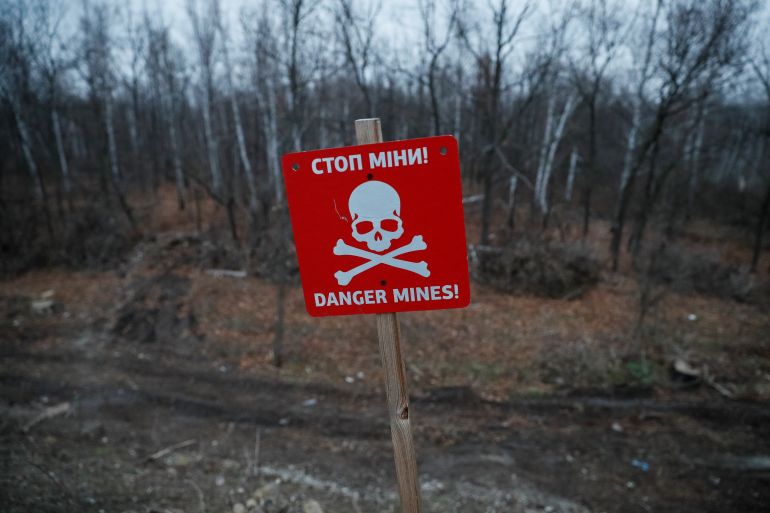Ukraine to get US land mines for use against Russian forces: Reports
US President Biden’s decision to provide antipersonnel mines comes after Ukraine fired ATACMS missiles into Russia.
A landmine warning sign is seen near the contact line between Ukrainian troops and pro-Moscow forces in Ukraine’s Luhansk region in 2019 [File: Gleb Garanich/Reuters]Published On 20 Nov 202420 Nov 2024
US President Joe Biden has approved providing antipersonnel land mines to Ukraine in what has been seen as another policy reversal on weapons provided to Kyiv by the outgoing United States administration, according to reports.
The US expects Ukraine to use the land mines in its own territory, though it has committed not to use them in areas populated with civilians, a US official told the Reuters news agency on Wednesday.
The Washington Post first reported the move by Biden, which reverses his earlier reluctance to provide land mines due to concerns over the risk they present to civilian populations, which antimine campaigners say is unacceptably high.
Ukraine has received US-made antitank mines throughout the war against invading Russian forces, but the addition of antipersonnel mines is aimed at stalling the expanding advance of Russian ground forces in recent months, a US official told the Reuters news agency, speaking on condition of anonymity.
The US land mines to be provided to Ukraine are “non-persistent”, the US official said, meaning they require a battery to detonate and will not explode once the battery runs out after a preset period of time.
The provision of US land mines comes on the heels of Ukraine’s use of US-provided ATACMS (Army Tactical Missile System) missiles to strike targets inside Russian territory for the first time, following newly-granted permission from Biden that advanced US weaponry could be used offensively against targets in Russia.
Moscow warned on Tuesday that it would respond to Ukraine’s firing of the longer-range ATACMS missiles, which reportedly hit targets in Russia’s Bryansk region.
Russian Foreign Minister Sergey Lavrov said the missile attack showed that Western countries wanted to “escalate” the conflict.
“We will be taking this as a qualitatively new phase of the Western war against Russia. And we will react accordingly,” Lavrov told a news conference at the G20 summit in Brazil.
Russian President Vladimir Putin signed a decree on Tuesday lowering the threshold for using nuclear weapons, a move that the White House, United Kingdom and European Union condemned as “irresponsible”.
The Kremlin also said on Wednesday that a special communications hotline established decades ago to avert potential nuclear conflict between the US and Russia is not currently in use as tensions escalate between Moscow and Washington amid Russia’s war in Ukraine.
“We have a special secure line for communication between the two presidents, Russia and the United States. Moreover, even for video communication,” Kremlin spokesperson Dmitry Peskov told Russia’s RIA news agency.
But when asked whether this channel was currently in use, Peskov said, “No.”
The hotline between Moscow and Washington was established in 1963 to reduce the misperceptions that stoked the Cuban Missile Crisis of 1962 by allowing direct communication between the US and Russian leaders.
Russian diplomats say the crisis between Moscow and Washington now is comparable to the Cuban crisis, when the two Cold War superpowers came closest to intentional nuclear war, and that the West is making a mistake if it thinks Russia will back down over Ukraine.
